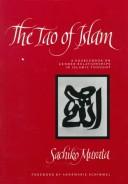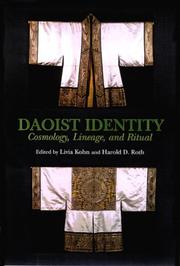| Listing 1 - 8 of 8 |
Sort by
|

ISBN: 0585068887 9780585068886 0791409139 0791409147 9781438413938 1438413939 Year: 1992 Publisher: Albany, N.Y. State University of New York Press
Abstract | Keywords | Export | Availability | Bookmark
 Loading...
Loading...Choose an application
- Reference Manager
- EndNote
- RefWorks (Direct export to RefWorks)
Women in Islam. --- Islam --- Islamic cosmology. --- Tao. --- Religion --- Philosophy & Religion --- Dao --- Way (Chinese philosophy) --- Philosophy, Chinese --- Truth --- Virtue --- Taoism --- Cosmology, Islamic --- Muslim cosmology --- Cosmology --- Dogma, Islamic --- Islamic theology --- Kalam --- Muslim theology --- Theology, Islamic --- Theology, Muslim --- Doctrines. --- Philosophy --- Gender --- Book
Book
ISBN: 1608336840 9781608336845 9781626982192 Year: 2017 Publisher: Maryknoll
Abstract | Keywords | Export | Availability | Bookmark
 Loading...
Loading...Choose an application
- Reference Manager
- EndNote
- RefWorks (Direct export to RefWorks)
Christianity and other religions --- Christianity --- Tao. --- Philosophical theology. --- Taoism. --- Confucianism. --- East Asian. --- Dao --- Way (Chinese philosophy) --- Philosophy, Chinese --- Truth --- Virtue --- Taoism --- Religions --- Church history --- Syncretism (Christianity) --- Daoism --- Taouism --- Tao --- Theology, Philosophical --- Philosophy and religion --- Theology, Doctrinal --- Relations --- History

ISBN: 0824824296 0824825047 9780824825041 Year: 2002 Publisher: Honolulu University of Hawaii press
Abstract | Keywords | Export | Availability | Bookmark
 Loading...
Loading...Choose an application
- Reference Manager
- EndNote
- RefWorks (Direct export to RefWorks)
Taoism --- Taoïsme --- Tao. --- S13A/0401 --- S12/0500 --- S12/0510 --- China: Religion--Popular religion: Taoism --- China: Philosophy and Classics--Laozi and Taoism (incl. Daodejing) --- China: Philosophy and Classics--Other Taoists and their works --- Taoïsme --- Tao --- Dao --- Way (Chinese philosophy) --- Philosophy, Chinese --- Truth --- Virtue
Book
ISBN: 9780500800027 9780500810026 0500800022 0500810028 Year: 1973 Publisher: London Thames
Abstract | Keywords | Export | Availability | Bookmark
 Loading...
Loading...Choose an application
- Reference Manager
- EndNote
- RefWorks (Direct export to RefWorks)
Tao. --- S12/0500 --- S13A/0401 --- S17/0410 --- #BIBC:bibl.Cerulus --- #SML: Joseph Spae --- China: Philosophy and Classics--Laozi and Taoism (incl. Daodejing) --- China: Religion--Popular religion: Taoism --- China: Art and archaeology--Symbolism in Chinese art, iconography --- Tao --- Dao --- Way (Chinese philosophy) --- Philosophy, Chinese --- Truth --- Virtue --- Taoism
Book
ISBN: 3642431046 3642293166 9786613939531 3642293174 1283627086 Year: 2012 Publisher: Heidelberg ; New York : Springer,
Abstract | Keywords | Export | Availability | Bookmark
 Loading...
Loading...Choose an application
- Reference Manager
- EndNote
- RefWorks (Direct export to RefWorks)
“In his capacious work Major Aspects of Chinese Religion and Philosophy - Dao of Inner Saint and Outer King Shan Chun does not only explore the innate relations between Confucianism, Daoism and Buddhism since their origins till its recent developments. By relating the three major traditions of Chinese philosophy he also attempts to concentrate the New-Confucianism on its unified origins and substantial implications by applying its inherent endeavour to relate and unite all spheres: these topics being the intimate relations between religion and philosophy, their inner and outer way (including the correlation between Confucian and Daoist legacies) as well as the unity between cosmos (heaven), country, state, society and family.” Prof. Dr. Claudia Bickmann, Professor of Philosophy, University of Cologne, Germany “Masterful introduction to traditional Chinese ways of thinking, embodied in the “three teachings” of Confucianism, Daoism, and Buddhism.” Albert Welter, Professor of East Asian Religions, University of Winnipeg, Canada “A valuable resource for those seeking a deeper understanding of Chinese philosophy and religion.” Richard N. Stichler, Professor of Philosophy, Alvernia University, USA “This is a work that will satisfy both the curious non-specialist and the seasoned scholar in its treatment of a highly pertinent topic to the future of China, and not only its past.” Rosita Dellios Associate Professor of International Relations, Bond University, Australia “A very revealing view of how a learned, serious Chinese intellectual understands the diverse riches to be found in the Chinese tradition. Attempting to cover virtually all of the Chinese philosophical and religious traditions and relate them to Western ideas, willing to pursue normative conclusions and discuss their applicability to modern life.” Lee H. Yearley, Walter Y. Evans-Wentz Professor, Religious Studies, Stanford University .
China -- Religion. --- Confucianism. --- Confucianism -- China. --- Confucianism -- Relations. --- Philosophy, Confucian. --- Religion --- Philosophy & Religion --- Religion - General --- Philosophy, Chinese. --- Tao. --- China --- Religion. --- Dao --- Way (Chinese philosophy) --- Chinese philosophy --- Philosophy. --- Philosophy of Religion. --- Philosophy, general. --- Philosophy, Chinese --- Truth --- Virtue --- Taoism --- Philosophy (General). --- Mental philosophy --- Humanities --- Religion—Philosophy.
Book
ISBN: 9789577396358 9577396356 Year: 2008 Publisher: 臺北 卷樓圖書股份有限公司
Abstract | Keywords | Export | Availability | Bookmark
 Loading...
Loading...Choose an application
- Reference Manager
- EndNote
- RefWorks (Direct export to RefWorks)
S12/0400 --- S12/0500 --- S04/0500 --- China: Philosophy and Classics--Kongzi 孔子 Confucius and Confucianism --- China: Philosophy and Classics--Laozi and Taoism (incl. Daodejing) --- China: History--Ancient (Pre-Han and Han, incl. Sima Qian) --- Manuscripts, Chinese --- Philosophy, Chinese --- Philosophy, Chinese. --- Tao. --- Taoism. --- History and criticism. --- Tao --- Taoism --- Daoism --- Taouism --- Religions --- Dao --- Way (Chinese philosophy) --- Truth --- Virtue --- Chinese philosophy --- Chinese manuscripts --- History and criticism
Book
ISBN: 0585138400 9780585138404 Year: 1998 Publisher: [Place of publication not identified] Blue Poppy Press
Abstract | Keywords | Export | Availability | Bookmark
 Loading...
Loading...Choose an application
- Reference Manager
- EndNote
- RefWorks (Direct export to RefWorks)
Nutrition --- Tao --- Health --- Medicine, Chinese --- Public Health - General --- Public Health --- Health & Biological Sciences --- Chinese medicine --- TCM (Medicine) --- Traditional Chinese medicine --- Traditional medicine --- Personal health --- Wellness --- Medicine --- Physiology --- Diseases --- Holistic medicine --- Hygiene --- Well-being --- Dao --- Way (Chinese philosophy) --- Philosophy, Chinese --- Truth --- Virtue --- Taoism --- Alimentation --- Food --- Diet --- Dietetics --- Digestion --- Food habits --- Malnutrition --- Health aspects
Book
ISBN: 9400743173 9786613946188 9400743181 1283633736 9400796854 9789400743175 9789400796850 Year: 2013 Publisher: New York : Springer,
Abstract | Keywords | Export | Availability | Bookmark
 Loading...
Loading...Choose an application
- Reference Manager
- EndNote
- RefWorks (Direct export to RefWorks)
Han Fei, who died in 233 BC, was one of the primary philosophers of China’s classical era, a reputation still intact despite recent neglect. This edited volume on the thinker, his views on politics and philosophy, and the tensions of his relations with Confucianism (which he derided) is the first of its kind in English. Featuring contributions from specialists in various disciplines including religious studies and literature, this new addition to the Dao Companions to Chinese Philosophy series includes the latest research. It breaks new ground with studies of Han Fei’s intellectual antecedents, and his relationship as a historical figure with Han Feizi, the text attributed to him, as well as surveying the full panoply of his thought. It also includes a chapter length survey of relevant scholarship, both in Chinese and Japanese.
Han, Fei, -- d. 233 B.C. --- Philosophy (General). --- Philosophy, Chinese. --- Philosophy, Chinese --- Philosophy & Religion --- Philosophy --- Tao. --- Fei, Han. --- Dao --- Way (Chinese philosophy) --- Chinese philosophy --- Philosophy. --- History. --- Political theory. --- Political philosophy. --- Philosophy, Asian. --- Cultural studies. --- Non-Western Philosophy. --- History, general. --- Political Theory. --- Political Philosophy. --- Cultural Studies. --- Truth --- Virtue --- Taoism --- Political science --- Political philosophy --- Administration --- Civil government --- Commonwealth, The --- Government --- Political theory --- Political thought --- Politics --- Science, Political --- Social sciences --- State, The --- Annals --- Auxiliary sciences of history --- Asian philosophy --- Oriental philosophy --- Philosophy, Oriental --- Han, Fei, --- Gan, Bi, --- Han, Fe-dsi, --- Han, Fei-tzu, --- Han, Fei Zi, --- Han, Feizi, --- Han, Fey-tze, --- Hàn Phi tử, --- Han, Pi-ja, --- Hanfeizi, --- Kampi, --- Kampishi, --- Kan, Hi, --- Kan, Pi, --- Kanpi, --- Kanpishi, --- 韩非, --- 韩非子, --- 韓非, --- 韓非子, --- Han, Fei --- Han, Fei Tzu --- Han, Feizi --- Philosophy - China - Taoism --- Philosophy, Taoist --- Civilization - Chinese influences --- Civilization --- Philosophy, Modern. --- Political science. --- Culture --- Philosophical Traditions. --- Study and teaching. --- Cultural studies --- Modern philosophy
| Listing 1 - 8 of 8 |
Sort by
|

 Search
Search Feedback
Feedback About UniCat
About UniCat  Help
Help News
News